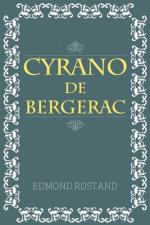|
|
Cyrano de Bergerac Author/Context
Edmond Rostand was born in 1868 in Marseilles, France, on what is now known as Rue Edmond-Rostand. Rostand's family was active in the arts, his uncle was a famous composer, his aunt a poet. Rostand always believed that the more flamboyant aspects of his personality came from his paternal grandmother, who was Spanish. An avid student, Edmond excelled at his schoolwork, and was thought of as his school's best poet. After completing college, Rostand pursued a career in writing, while practicing law during the day to appease his family. He gained national attention in 1887 with the publishing of his first book of poetry, Les Musardises. The book was dedicated to his fiancée, Rosemonde Gerard, who he married later the same year. The couple had their first child, Maurice, in 1891. Around then, Rostand began to turn his focus towards writing for the theatre.
Between 1886 and 1887 Rostand wrote his most famous play, Cyrano. This was followed by The Eaglet. In 1900, he received the Legion of Honor from the French government. His health began to fail, and he retired to the Pyrenees, where he convalesced until his health improved. He never really felt comfortable with the attention that fame brought him, and always preferred to be closer to nature. He was called out of semi-retirement by the actor, Le Bargy, who asked him to write a farewell play to close off his career. Rostand's final play, The Last Night of Don Juan was well received by the public, and it proved an appropriate end for his career as a playwright. In his final years, horrified by the nightmare of the first World War, Rostand took to writing patriotic poems to inspire his countrymen. He lived just long enough to see the war end, dying only weeks after Armistice Day, in 1918.
Cyrano De Bergerac is the most important of Rostand's plays, and also his most successful. Many consider it to be one of the finest plays that France has ever produced. It was inspired by a real-life figure, who was one of the world's first writers of science-fiction, as well as a famous swordsman and poet. It was a bit of an anachronism when first produced, it was a throwback to the Romantic period of French theater, which ended in the early part of the 19th century. The producers of the play were so sure that it wouldn't succeed that they kept all expenses down to a minimum, forcing Rostand to pay for all the character's period costumes himself - an expense of over one hundred thousand francs. After the first performance of the play, once the curtain had closed, the audience gave it a round of applause that lasted for over an hour. The character of Cyrano has grown into one of the theatre's most beloved roles, and the play is one of the most frequently produced in the world. The play has been adapted into film on more than ten occasions, and its continuing popularity to this day is a tribute to the how universal the themes and characters of the play are.
Bibliography
Amola, Alba. Edmond Rostand. G. K. Hall & Co., Boston, 1978.
Rostand, Edmond and John Murrell, Trans. Cyrano de Bergerac, T. Blizzard Publishing Inc., Winnipeg, 1995.




